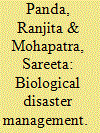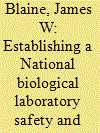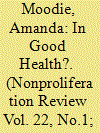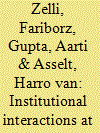|
|
|
Sort Order |
|
|
|
Items / Page
|
|
|
|
|
|
|
| Srl | Item |
| 1 |
ID:
102725


|
|
|
| 2 |
ID:
126123


|
|
|
|
|
| Publication |
2012.
|
| Summary/Abstract |
The growing concern over the potential use of biological agents as weapons and the continuing work of the Biological Weapons Convention has promoted an interest in establishing national biological laboratory biosafety and biosecurity monitoring programs. The challenges and issues that should be considered by governments, or organizations, embarking on the creation of a biological laboratory biosafety and biosecurity monitoring program are discussed in this article. The discussion focuses on the following questions: Is there critical infrastructure support available? What should be the program focus? Who should be monitored? Who should do the monitoring? How extensive should the monitoring be? What standards and requirements should be used? What are the consequences if a laboratory does not meet the requirements or is not willing to comply? Would the program achieve the results intended? What are the program costs? The success of a monitoring program can depend on how the government, or organization, responds to these questions.
|
|
|
|
|
|
|
|
|
|
|
|
|
|
|
|
| 3 |
ID:
142652


|
|
|
|
|
| Summary/Abstract |
Since the 1990s, the group of stakeholders working to combat biological weapons (BW) proliferation has broadened to include new actors who have not traditionally focused on security issues, including organizations from the public health sector, researchers in the life sciences, and the biosafety community. This has had significant benefits for the Biological and Toxin Weapons Convention (BWC) and the arms control establishment more broadly. However, the BWC's agenda has become increasingly dominated by issues of international health and global health security. By focusing solely on response strategies, the United States and other interested parties risk losing sight of other important elements of a counter-BW strategy, including deterrence and prevention. Focusing on public health-related issues to the exclusion of more traditional security matters puts the nonproliferation regime at risk, because it limits the amount of time that stakeholders have available to grapple with the critical questions facing the BWC and the biological weapons nonproliferation establishment—questions that must be answered if the regime is to survive.
|
|
|
|
|
|
|
|
|
|
|
|
|
|
|
|
| 4 |
ID:
117946


|
|
|
|
|
| Publication |
2013.
|
| Summary/Abstract |
This article argues that institutional interactions that cut across the domains of trade and environment are embedded in overarching norms that shape their evolution and impact. In making this argument, it analyzes three cases of such interactions within the climate change and biosafety regime complexes: those relating to trade-related climate policies and measures, forest carbon sinks, and trade in genetically modified organisms. The analysis highlights the dominance of liberal environmentalism (a set of global norms promoting economic efficiency and environmental improvements through market-based mechanisms) in shaping institutional interactions within these regime complexes, even as liberal environmentalism is contested by key actors. This, in turn, has implications for effective management of institutional interlinkages within regime complexes in global environmental governance.
|
|
|
|
|
|
|
|
|
|
|
|
|
|
|
|
| 5 |
ID:
107464


|
|
|
|
|
| Publication |
2011.
|
| Summary/Abstract |
The Seventh Review Conference of the Biological Weapons Convention in December 2011 provides an opportunity to modernize the treaty to better address the challenges of the 21st century. The key to this modernization is to redesign the treaty's Confidence-Building Measures (CBMs), the only formal mechanism for increasing transparency and demonstrating compliance with the treaty, to address changes in the global scientific, health, and security environments since the end of the Cold War. The scope of the CBMs should be expanded beyond state-run biological warfare programs to encompass a broader array of threats to global security, such as biological terrorism, laboratory accidents, dual-use research, and disease pandemics. Modernizing the CBM mechanism to take into account these new risks would extend the transparency-enhancing benefits of CBMs to a range of new and important topics, such as biosafety, laboratory biosecurity, and dual-use research oversight; make the CBMs and the treaty itself more relevant to the concerns and priorities of more states; and build on progress made during the recent series of intersessional meetings. To accomplish this, the CBMs need to be revised to shift their focus from hardware, the dual-use capabilities relevant to the treaty, to software, the political and legal institutions that govern the development and use of these capabilities. A more modern CBM mechanism should encourage greater participation in the confidence-building process, improve international cooperation against the full spectrum of biological risks, and promote the goal of universal membership in the treaty.
|
|
|
|
|
|
|
|
|
|
|
|
|
|
|
|
| 6 |
ID:
117940


|
|
|
|
|
| Publication |
2013.
|
| Summary/Abstract |
Understanding the impact ofregime complexes on global governance calls
for creative policy thinking. This introduction provides a new and more
precise definition of the concept of regime complex. It also suggests specific tools to characterize regime complexes and analyze their impacts on
global governance. The articles in this issue deepen the analytical understanding of complexes by examining concrete examplesin various domains
of global governance such as piracy, taxation, energy, food security, emissions reduction, carbon sinks, biosafety, and refugee governance. In addition to providing an in-depth description of a variety of different regime
complexes, this issue is innovative on three accounts: (1) it presents complexes as both barriers and opportunities for global governance and gives
explanations for these diverse outcomes; (2) it shows how a broad spectrum of actors is necessary for understanding the creation and evolution
of complexes; and (3)it qualifiesformer claimsto the effectthat only powerful actors can impact regime complexes. institutional density.
|
|
|
|
|
|
|
|
|
|
|
|
|
|
|
|
|
|
|
|
|